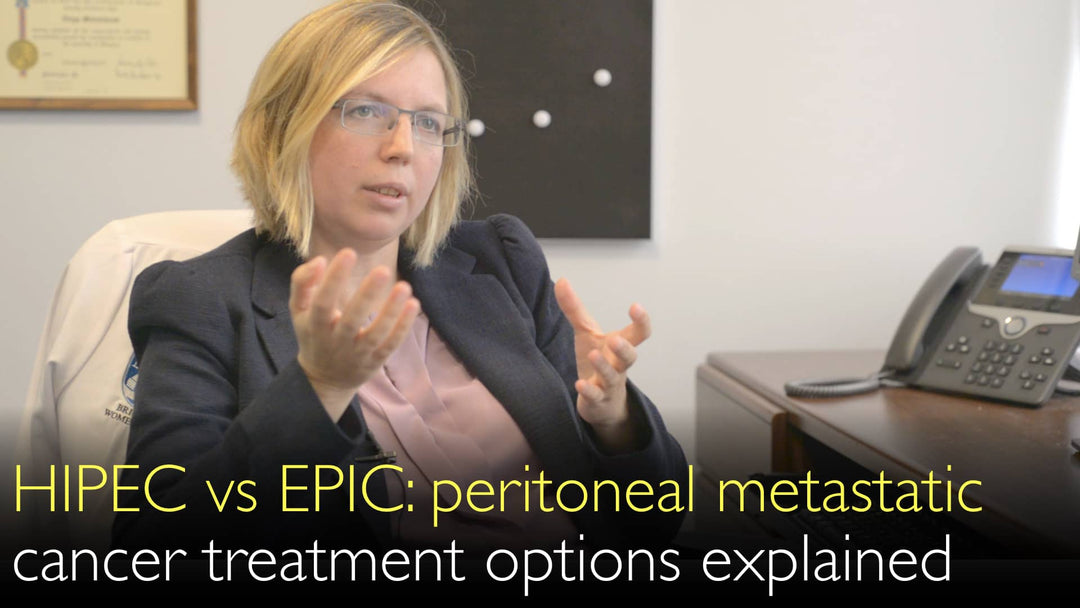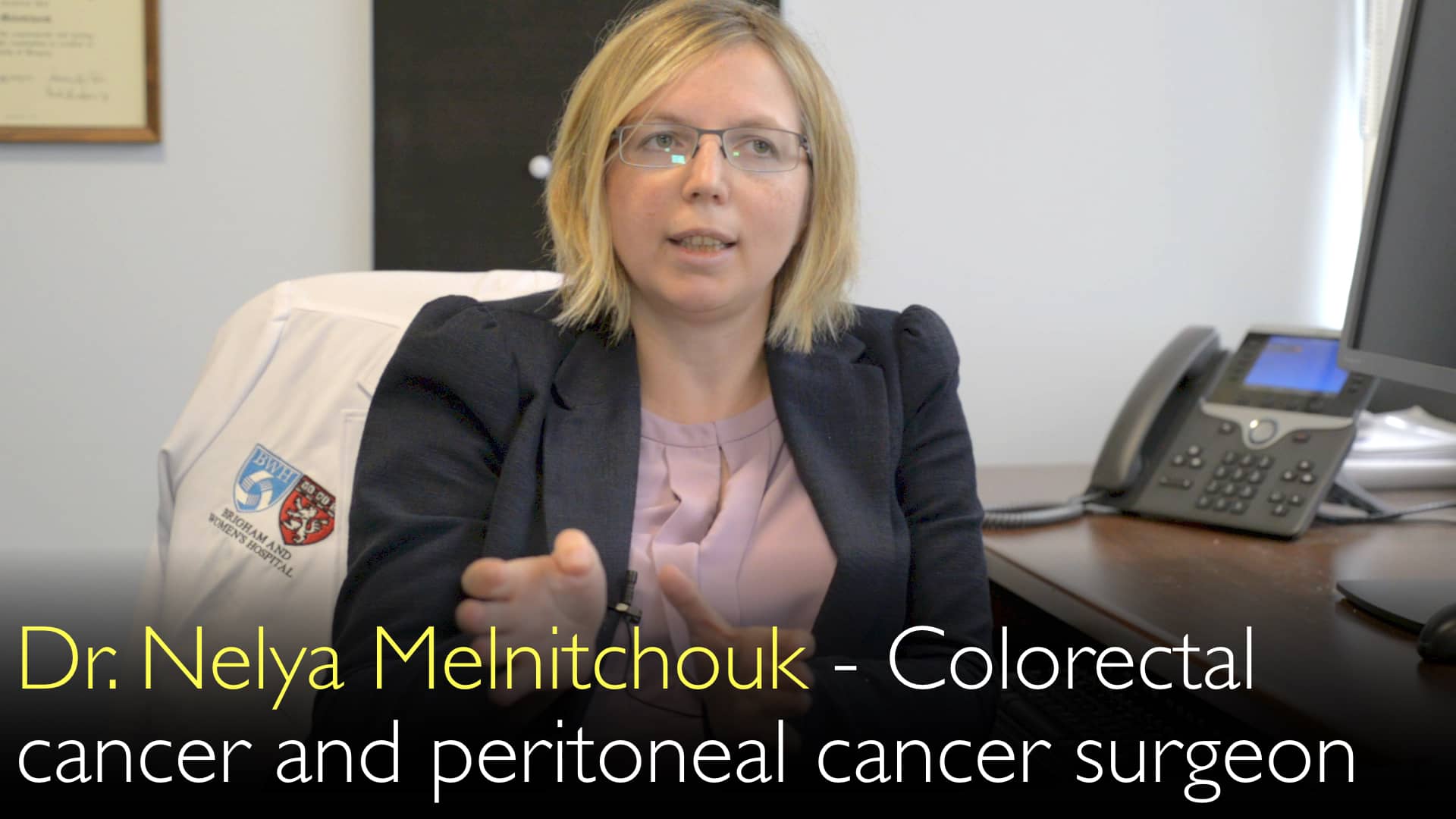Leading expert in peritoneal surface malignancies, Dr. Nelya Melnitchouk, MD, explains the critical differences between HIPEC and EPIC treatments for metastatic peritoneal cancer. She details how these advanced intraperitoneal chemotherapy procedures work. Dr. Melnitchouk describes the timing, chemotherapeutic agents, and patient selection for each approach. She also discusses an ongoing clinical trial directly comparing HIPEC and EPIC efficacy. The goal is to eradicate microscopic cancer cells after cytoreductive surgery.
HIPEC vs EPIC: Advanced Treatments for Peritoneal Metastases
Jump To Section
- Understanding Peritoneal Metastases
- HIPEC Procedure Details
- EPIC Procedure Details
- Chemotherapy Agent Selection
- Clinical Trial Comparison
- Repeat Procedures & Challenges
- Full Transcript
Understanding Peritoneal Metastases
Peritoneal surface malignancies occur when cancer spreads to the lining of the abdominal cavity, the peritoneum. Dr. Nelya Melnitchouk, MD, explains that this condition often arises from primary cancers like colorectal cancer, appendiceal cancer, and mesothelioma. A major challenge is that these metastases frequently respond poorly to systemic chemotherapy alone.
The cornerstone of treatment is cytoreductive surgery. This complex procedure involves surgically removing all visible tumor deposits from the abdominal cavity. Dr. Nelya Melnitchouk, MD, emphasizes that even after a successful visible tumor removal, microscopic cancer cells inevitably remain. This is where intraperitoneal chemotherapy becomes essential to target those residual cells directly.
HIPEC Procedure Details
Hyperthermic Intraperitoneal Chemotherapy, or HIPEC, is administered immediately following cytoreductive surgery. Dr. Nelya Melnitchouk, MD, describes how heated chemotherapy solution, typically at 42 degrees Celsius (107.6°F), is circulated in the abdomen for 90 to 100 minutes. The heat itself is a critical component, as cancer cells are more sensitive to hyperthermia than healthy tissue.
Patient safety during the HIPEC procedure is paramount. Dr. Nelya Melnitchouk, MD, notes that the surgical team, including the anesthesiologist, meticulously monitors the patient's core body temperature. Cooling blankets are used if necessary to prevent overheating from the heated intra-abdominal chemotherapy. After the procedure, the abdomen is closed, and the patient begins standard postoperative recovery.
EPIC Procedure Details
Early Post-operative Intraperitoneal Chemotherapy, or EPIC, represents a different timing strategy. Dr. Nelya Melnitchouk, MD, clarifies that EPIC begins after the surgery is complete and the patient has started recovery. The goal is to initiate chemotherapy via an abdominal port on postoperative day 1 or 2, provided the patient is medically stable.
The urgency for early administration is driven by biology. Dr. Nelya Melnitchouk, MD, explains that abdominal adhesions begin forming quickly after any surgery. These adhesions can create pockets that shield cancer cells from the chemotherapy solution. By starting EPIC early, surgeons aim to maximize distribution and exposure before these physical barriers develop. The treatment typically continues for three days post-surgery.
Chemotherapy Agent Selection
The choice of chemotherapeutic agent is not random; it is dictated by the primary tumor's origin and histology. Dr. Nelya Melnitchouk, MD, states that for colorectal and appendiceal cancers, Mitomycin C or Oxaliplatin are standard for HIPEC. For mesothelioma or ovarian cancer metastases, Cisplatin is often the agent of choice, sometimes combined with Mitomycin C.
Dr. Melnitchouk also highlights a key pharmacological difference between the procedures. HIPEC typically utilizes Mitomycin C, while the EPIC protocol often employs a different drug combination: FUDR (Floxuridine) and Leucovorin. She notes that the selection is currently based on tumor type rather than genetic testing, as evidence for genotype-directed chemotherapy in this context is still lacking.
Clinical Trial Comparison
A significant development in the field is a head-to-head clinical trial comparing HIPEC and EPIC. Dr. Nelya Melnitchouk, MD, is involved in this research, which focuses on patients with colorectal and appendiceal cancers that have spread to the peritoneum. The trial aims to provide high-level evidence on which method offers superior outcomes.
The rationale for the trial includes the theoretical advantages of each approach. As Dr. Melnitchouk discussed with Dr. Anton Titov, MD, HIPEC delivers chemotherapy under hyperthermic conditions during surgery. In contrast, EPIC provides a longer exposure time to chemotherapy agents in the days following the operation. This trial will help determine which factor—heat or duration—is more critical for patient survival.
Repeat Procedures & Challenges
Performing a second HIPEC or EPIC procedure is complex and challenging. Dr. Nelya Melnitchouk, MD, explains that the initial surgery and chemotherapy cause significant adhesions and scar tissue formation within the abdomen. This altered anatomy makes a subsequent cytoreduction much more technically difficult for the surgeon.
Despite these challenges, repeat procedures are sometimes performed for recurrent disease. Dr. Nelya Melnitchouk, MD, notes that if Mitomycin C was used initially, Oxaliplatin might be selected for a repeat HIPEC procedure. This approach requires a highly specialized surgical team experienced in managing the complications of re-operative surgery in the peritoneal cavity.
Full Transcript
Dr. Anton Titov, MD: You are leading a peritoneal surface malignancy program at a major US hospital. HIPEC is Hyperthermic Intraperitoneal Chemotherapy. HIPEC usually accompanies the microsurgical resection of cancer metastases that spread along the peritoneum. What is new in HIPEC treatment? What variations of the HIPEC procedure are now available to patients?
Dr. Nelya Melnitchouk, MD: The peritoneal malignancy program here treats patients with colorectal cancer with peritoneal spread. We also treat appendiceal cancer with peritoneal spread. We treat with HIPEC patients with mesothelioma. Usually patients with peritoneal disease don't respond well to systemic chemotherapy.
One of the methods of treating these patients is performing cytoreduction. It means we are going into the abdomen. We are removing all the visible cancer disease surgically. Then we are adding intraperitoneal chemotherapy to peritoneal cavity in the abdomen.
The rationale for intraperitoneal chemotherapy is this. You remove all the visible cancer disease from peritoneum. But there are definitely invisible cancer cells. They are present in the peritoneal cavity after your cytoreduction. Hopefully intraperitoneal chemotherapy would destroy those cancer cells.
There are two ways of doing intraperitoneal chemotherapy. One method is done during the cancer surgery. It is called Heated Intraperitoneal Chemotherapy, HIPEC. HIPEC is done for 90 to 100 minutes during the surgery. The chemotherapy is heated. The heat helps us to kill the cancer cells. Because cancer cells are more sensitive to heat than your normal cells. Then it is chemotherapy in addition to the heat.
Then the patient’s abdomen is closed by surgeon. Patient has normal post-operative care after HIPEC. Another option to do intraperitoneal chemotherapy is called EPIC. This is Early Post-operative Intraperitoneal Chemotherapy. EPIC is done after the surgery is completed. EPIC is done when patient is recovering from the surgery. EPIC is done via the port placed in the abdomen.
We usually do it for three days after the surgical operation (cytoreduction). The patient has to recover enough to be ready for EPIC. We actually right now have a clinical trial comparing these two approaches in patients with colorectal and appendiceal malignancy with peritoneal spread. We compare HIPEC with EPIC.
Dr. Anton Titov, MD: What is usually the temperature of chemotherapeutic solution that you put into the patient's abdomen?
Dr. Nelya Melnitchouk, MD: It's 42 degrees Celsius. Chemotherapy is given over 90 to 100 minutes. You have to make sure that the patient is not overheating during this heated chemotherapy. We have anesthesiologist to pay attention to the body temperature. We use cooling blankets if we need to decrease patient’s body temperature. But intraabdominal chemotherapy solution is 42 degrees Celsius.
Dr. Anton Titov, MD: EPIC is Early Post-operative Intraperitoneal Chemotherapy procedure. What is the time period that passes between the cytoreductive surgery and start of EPIC chemotherapy?
Dr. Nelya Melnitchouk, MD: We usually like to start on a postoperative day 1. It mean the next day after the surgery. We hope that the patient is able to tolerate EPIC. Patients must meet certain criteria. They have to be medically stable. Patients should not have elevated leucocyte count. They have to be recovering well from the cytoreductive surgery.
Sometimes Early Post-operative Intraperitoneal Chemotherapy doesn't happen on post-operative day 1. Then we start on post-operative day 2. But the goal is actually to start EPIC early in the course of the post-operative treatment. Because there a problem with post-operative chemotherapy. Adhesions tart forming in the abdomen after cytoreductive surgery. Because adhesions form in the abdomen after any kind of surgical operation.
Then intraperitoneal chemotherapy might not be able to access all the parts in the abdomen. This is why we want to do Early Post-operative Intraperitoneal Chemotherapy earlier rather than later.
Dr. Anton Titov, MD: EPIC continues for several days after surgery? Instead of HIPEC going for 60 to 90 minutes during the cytoreductive surgery.
Dr. Nelya Melnitchouk, MD: Exactly, exactly. That's the benefit of the post-operative intraperitoneal chemotherapy. Because there is a longer exposure of these cancer cells to the chemotherapy medication during EPIC. We are using different chemotherapy medications in post-operative intraperitoneal chemotherapy.
For the HIPEC we use Mitomycin C. For the EPIC we use use FUDR, Floxuridine, and Leucovorin. It is two different medications. But some centers in the US do one chemotherapy medication in EPIC. Other centers just do another medication during post-operative intraperitoneal chemotherapy. Here we have a clinical trial to compare both HIPEC and EPIC treatments.
Dr. Anton Titov, MD: How chemotherapy medications are selected for HIPEC treatment of metastatic peritoneal cancer? Is it based on the primary tumor location? Is choice of chemotherapy based on the histology of primary tumor? Are you doing any genetic testing to select the chemotherapy regimen for the HIPEC treatment?
Dr. Nelya Melnitchouk, MD: Chemotherapy selection is based on the primary tumor. For example, for appendiceal cancer and colorectal cancer we use Mitomycin C or Oxaliplatin. For patients who have mesothelioma or ovarian cancer, we use Cisplatin. For mesothelioma we also use Mitomycin C.
We don't do any genetic testing to discover what other chemotherapy agents might work against the tumor. There is no evidence that genetic testing will affect choice of chemotherapy.
Dr. Anton Titov, MD: Do you have any evidence for changing the chemotherapeutic regimen in HIPEC or EPIC? How often repeat HIPEC or EPIC procedures are done?
Dr. Nelya Melnitchouk, MD: Repeat HIPEC or EPIC procedures are difficult. Surgeons do the first HIPEC or EPIC procedure. They do cytoreduction and heated chemotherapy. Then patients develop a good amount of adhesions in the abdomen. Performing cytoreduction surgery and heated chemotherapy for the second time is much more difficult. Because you have to deal with the recurrent cancer. You also have to deal with adhesions and scar tissue in the peritoneal cavity.
But we do repeat HIPEC and EPIC. We repeat Early Post-operative Intraperitoneal Chemotherapy procedure. We also repeat Hyperthermic Intraperitoneal Chemotherapy. Usually we use Mitomycin C as the first-line chemotherapy medication. Then we use Oxaliplatin for the repeat procedure of heated intraperitoneal chemotherapy.





